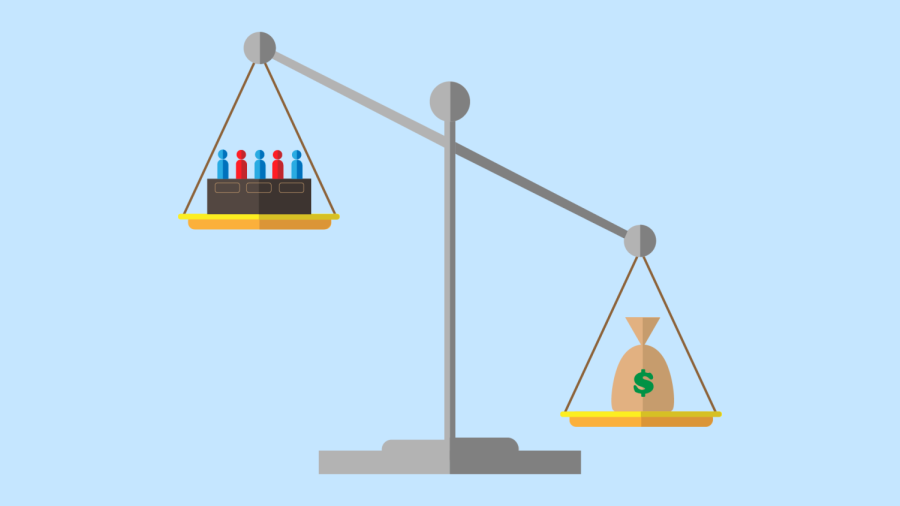Kincart: Let’s Make Engaging with Our Criminal Justice System More Accessible
(Graphic by Claire Peterson | The Daily Utah Chronicle)
February 11, 2022
When I first learned about juries, I thought I would love to be selected to participate in one. I was excited at the thought of watching and playing an active role in our criminal justice system.
But now that I’m older, it seems like a hassle. Taking time off work and school for jury duty or to be a witness feels like an inconvenience. To tackle this problem, Rep. Mike Winder proposes House Bill 93, the Juror and Witness Fee Amendments. This bill, as it stands in the first substitute, increases the payment for witnesses in Utah. H.B. 93 should pass to increase engagement with our criminal justice system. However, the bill requires more changes to make this a fully accessible process.
Only about 15% of U.S. adults receive jury summons each year, but 67% of adults say jury service is vital to good citizenship. The limited and infrequent engagement with jury service can lead to the idealized notion of good citizenship.
However, the realities of jury service are grim. Jurors and witnesses in Utah currently receive $18.50 for their first day of service and $49 for following days of service. $18.50 in a day is significantly less than a day of working a minimum wage job. For those highly dependent on their paycheck, serving on the jury instead of work is disadvantageous.
Stephen Nelson, an assistant professor at the University of Utah with experience as a prosecutor, explained that serving as a witness can be difficult. “The courts are not necessarily known for flexibility in terms of scheduling,” Nelson said in an interview. Coming in for service can be a “hardship” or a “sacrifice.”
H.B. 93 brings important attention to this issue and acts to mitigate some of these problems. The adopted first substitute of this bill allows witnesses to receive $49 for each following day of service. In an interview, Rep. Winder explained that Utah last increased their witness fees in 1998, which had a much lower cost of living.
Winder took up this bill because of his personal experience, along with two of his co-workers. He thought it was “ridiculous” given that he spent the entire day at the courthouse and was later dismissed. He said that although the amendments will significantly cost the state, “that’s money well spent, because we don’t want to be wasting people’s time.” He added, “If the witness fees are too low, which they are right now, then it’s witness abuse … If the number is too high, then it can be a hurdle for justice.”
However, current flaws in the system of juries and witnesses pose other hurdles to justice. If we want to prioritize jury and witness service, we need to go beyond what the first substitute of H.B. 93 calls for. We should increase the pay significantly. The initial proposed version of this bill did a better job at incentivizing witness and juror service. It called for a juror and witness to receive $60 for their first day of service and $120 for the following days. It would have also changed the reimbursement rate. Winder explained, “The original bill included raising [the pay] for jury members and witnesses, but that proved to be millions of dollars to the state … But I’m hoping that someone comes back next year and raises it for jury duty as well because it’s the same problem.”
Because of this problem, minority jury participation lacks. According to the American Bar Association, “Increasing juror pay or providing additional incentives, for example, can serve a dual role by increasing general juror turnout and encouraging individuals from lower socioeconomic backgrounds to appear by decreasing the opportunity costs associated with jury service.” With this information in mind, a future version of this bill could fix the larger issue of jury representation we currently face.
But we should also tackle other issues. Utah bans people currently incarcerated and with past felony convictions from serving on juries. Because the criminal justice system targets Black and Latinx people, this leads to a lack of jury diversity since those populations are disproportionately ineligible to serve. Jury diversity improves the effectiveness of a jury.
We need to engage jurors and witnesses by compensating them more. H.B. 93 will fix some of our larger issues with juries. The integrity of our criminal justice system relies on our participation as jurors and witnesses. It’s time our laws reflect that.










patrick shea • Feb 15, 2022 at 1:17 pm
Ms. Kincart’s editorial puts a spotlight on one of many flaws with our present legal system. I have represented prisoners, mostly on Civil Rights’ Claims. Through my visits to prisons and jails I have learned three things. First, instead of rehabilitating prisoners like they do in most European correctional institution, our system is one of the quickest educational institutions I have observed. Within two to three months many prisoners have been educated by fellow inmates about how to be better criminals. Second, the cost is $25,000 to $35,000 for a prisoner in minimum and between $50,000 to $75,000 for maximum security. Utah spends less than $8,000 per student for their education. Third, as Ms. Kindcart points out, with Utah having less than 2% Afro-American, yet this cohort composes more than 35%. A similar disparity exists for any other non-White population.
But, most uncaring and damaging, is when the prisoner is released there is no training program while the inmates our serving their time to help the prisoner to transition out of prison. As a result, Utah has over a 30% recidivism or return to prison.